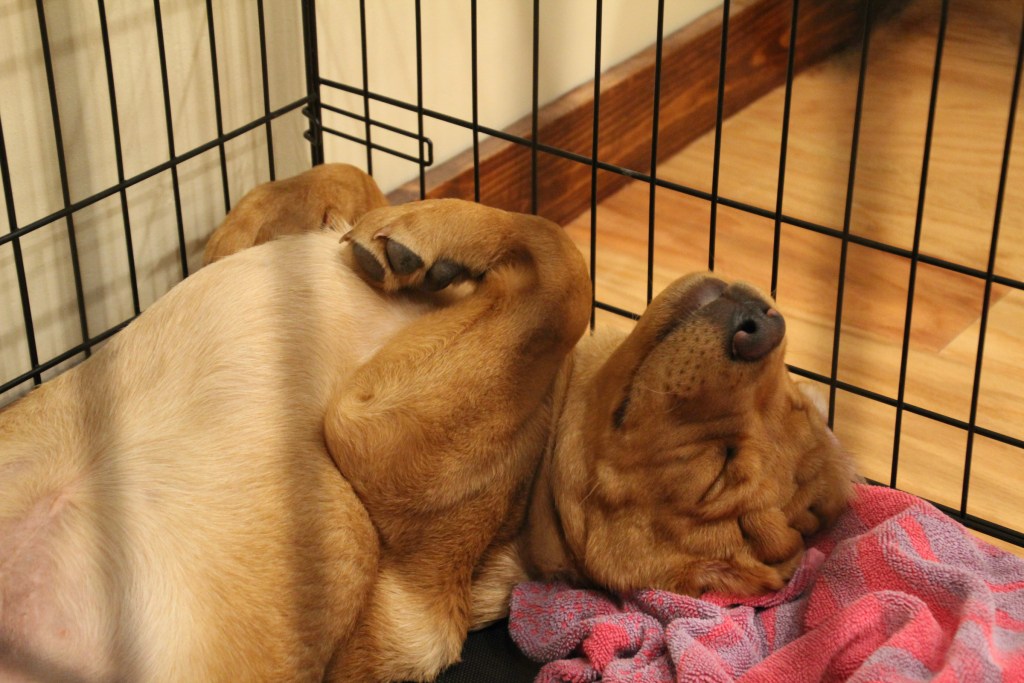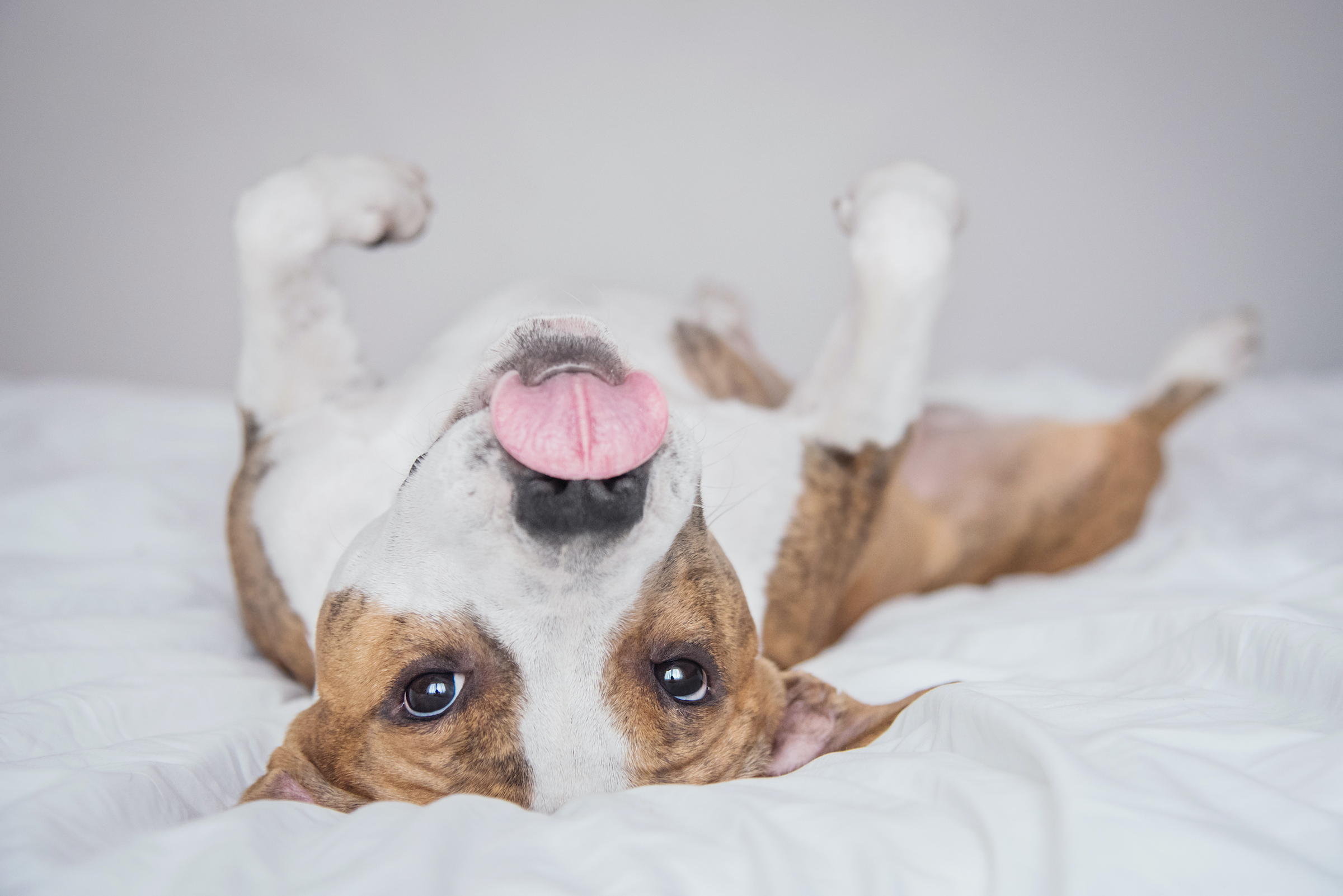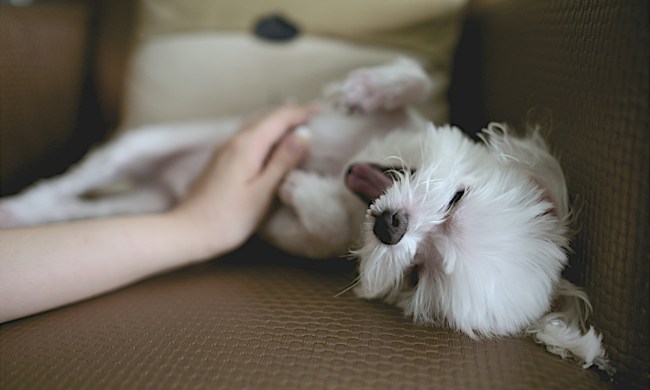
Dogs are wonderful companions. They’re sweet, loyal, and sometimes a bit goofy. However, their behavior isn’t always easy to understand, and they can sleep in some pretty unusual positions. Unique sleeping positions can mean anything, from discomfort and joint pain to just getting comfy. If you’ve ever looked over at your dog and seem them spread out on their back, you might be wondering if this behavior is as cute as it looks.
We’ve looked into this funny phenomenon to see what vets and canine behavior specialists had to say, and the answer is sweeter than you might expect! Here’s everything you need to know about what your dog’s sleeping position means.

Why do dogs sleep on their backs? Five reasons for this funny-looking position
Like any behavior or sleep position, back-sleeping can stem from many causes. Some of these reasons are more subtle than others, but none are reasons to worry about your pet’s health or well-being. Generally speaking, when a dog sleeps on their back, it’s a good thing!
Cooling off
Remember, dogs regulate their body temperature through their paws and skin, so sleeping on their backs may just be your buddy’s way of cooling off. Durango Animal Hospital’s Dr. Travis McDermott told Southern Living that having their paws and belly — where the fur is thinnest — in the air helps cool off these sensitive areas. It’s the same reason a dog might lie stomach down on a cool tile floor!
So, if you see your best bud napping with their belly up, they may just be trying to chill for a bit.
Submission
While awake, dogs rolling over to expose their stomach can be one way of expressing submission to another dog (or to a person), though it’s not impossible to fall asleep in this position — as almost any dog will prove. This stance is not one that has been observed in wolves or wild dogs, notes veterinarian Dr. Patty Khuly — at least, not while sleeping. It wouldn’t be a safe way to rest if there were predators out and about, after all.
They feel safe
Whether this is the main reason for your pup’s back-sleeping, it’s safe to say that any dog who chooses this position for naps feels secure where they are. Lying on their back is an incredibly vulnerable position, even for domestic dogs, says Dr. McDermott, so you can rest assured that your furry friend feels safe and sound at home when you see this.
Isn’t that great news? Whatever you’re doing as a pet parent, keep it up! Keeping our fur babies happy and healthy is the best feeling — make sure to enjoy it!
Seeking attention
If your pup knows you’re nearby while they flip onto their back, it’s possible they’re asking for a belly rub before they doze off for the moment. In times like this, your pup may not seem as sleepy. They may be focused on you instead of their nap, which can be equally as adorable.
If you indulge your buddy with some scratches in moments like this, you may be reinforcing this behavior. It’s up to you whether that is a good thing, but it’s something to keep in mind.
Comfort
Well — why do you sleep on your back? It’s comfy, right? Your dog probably feels the same way!
This is especially likely if your four-legged friend is deep in sleep in this position — it’s a great sign! A comfy pup is a well-rested, happy pup, after all.

Why it’s great news that dogs sleep on their backs — especially when it’s your dog
There are virtually no negative consequences to a dog sleeping on their back, so you don’t have a reason to worry! Nor should you worry if your dog doesn’t sleep like this. Plenty of other resting positions are signs of a happy dog, too.
Not only does back-sleeping mean your pup is comfortable, but they’re also feeling safe. If this is the case, you should give yourself a pat on the back for showing your best bud the love and security they rightfully deserve. You’re doing something right!

When should you worry about your dog’s sleeping position?
The main thing you should watch for in your dog’s sleeping position is any sudden changes, especially if it coincides with other changes in their behavior. Changes in their sleeping position may not mean anything serious. They might just be in the mood for a change, or perhaps their dog bed is starting to get worn out. Sleeping, more or less, is also a normal part of aging for dogs. However, if they stop sleeping on their back at the same time they seem less energetic or begin limping, it could be a sign that your dog is developing joint pain in their hips or back. If you’re unsure about a change in your dog’s behavior, it doesn’t hurt to bring it up to your vet.
Changes don’t always have to be negative, though. You might notice your dog starting to sleep on their back or curled up to you more often as they become more comfortable with you. This can be an especially heartwarming step in bonding with your new dog.
Now that you know what it means when a dog sleeps on their back, you can sit back and enjoy all of your goofy pup’s funny nap positions. You can smile and laugh at their silly postures with no guilt whatsoever — who doesn’t enjoy stretching out for a comfortable rest? Maybe you’ll even let it inspire you to get in on the coziness. Nap time, anyone?



